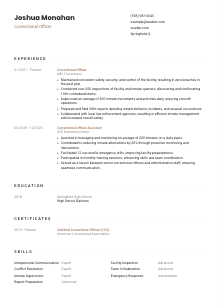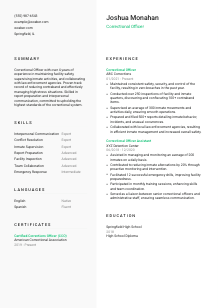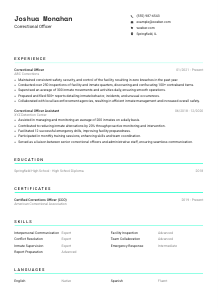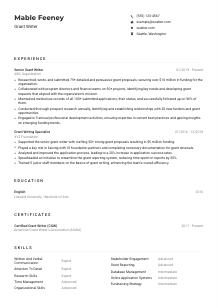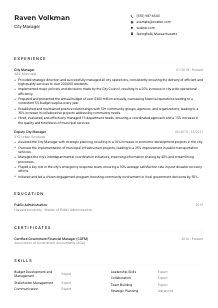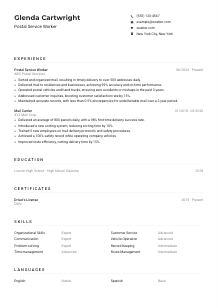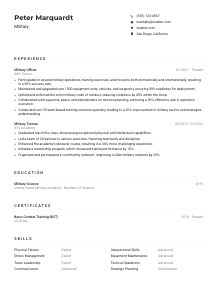Correctional Officer CV Example
Maintaining order behind bars, but your CV feels confined? Break free with this Correctional Officer CV example, structured using Wozber free CV builder. Learn how to present your enforcement expertise in a way that syncs with job requirements, building a career that's as secure as the facilities you monitor.
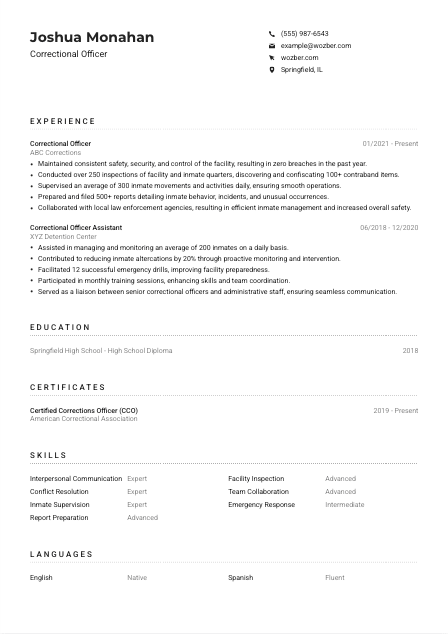
How to write a Correctional Officer CV?
Aspiring Correctional Officer, it's time to lock up your competition with a standout CV! The role you're aiming for demands more than standard qualifications—it requires grit, resilience, and a deep understanding of maintaining safety and security. In this tailored guide, empowered by Wozber's free CV builder, let's embark on creating an ATS-compliant CV that showcases your valor and skills uniquely suited for the demanding environment of corrections. Let's transform your CV into a powerful testament to your capabilities!
Personal Details
First impressions in the correctional field start with your CV. Think of the Personal Details section as your professional badge—clear, authoritative, and ready for scrutiny. Let's personalize your introduction to ensure that it's not just seen but remembered by hiring managers seeking exceptional correctional officers.
1. Badge Your Name
Your name is the headline of your career story. Present it boldly at the top. In the world of corrections, a strong, clear name presentation sets the tone for the authoritative figure you are.
2. Job Title Precision
Below your name, align with the role you're applying for by explicitly stating "Correctional Officer." This immediate clarity connects your application directly to the position, echoing the precision and attention to detail required in your role.
3. Direct Line of Communication
Ensure your phone number and email address are not just present, but professional and typo-free. Your email format of firstname.lastname@email.com projects the professionalism expected in law enforcement settings.
4. Confirm Your Territory
"Must be located in or willing to relocate to Springfield, IL."—the job description is clear. Highlight your Springfield, IL, location upfront to align with this necessity, removing any doubts about your availability for the role.
5. Digital Footprint
Providing a link to your LinkedIn profile or a professional website can offer deeper insights into your career and achievements. Ensure it's updated and reflective of your professional persona in the correctional field.
Takeaway
Your Personal Details section is more than administrative information; it's your first handshake with potential employers. Reflect professionalism and directness in every detail, setting a confident tone for the rest of your CV.





Experience
The heart of your CV beats in the Experience section. Here, you'll demonstrate how you've not just fulfilled roles but commanded them with skill, acumen, and unwavering commitment. For Correctional Officers, it's not just about listing duties—it's about showcasing your impact on facility safety, inmate management, and team collaboration.
- Maintained consistent safety, security, and control of the facility, resulting in zero breaches in the past year.
- Conducted over 250 inspections of facility and inmate quarters, discovering and confiscating 100+ contraband items.
- Supervised an average of 300 inmate movements and activities daily, ensuring smooth operations.
- Prepared and filed 500+ reports detailing inmate behavior, incidents, and unusual occurrences.
- Collaborated with local law enforcement agencies, resulting in efficient inmate management and increased overall safety.
- Assisted in managing and monitoring an average of 200 inmates on a daily basis.
- Contributed to reducing inmate altercations by 20% through proactive monitoring and intervention.
- Facilitated 12 successful emergency drills, improving facility preparedness.
- Participated in monthly training sessions, enhancing skills and team coordination.
- Served as a liaison between senior correctional officers and administrative staff, ensuring seamless communication.
1. Job Alignment Checklist
First, dissect the job post—"Maintain the safety, security, and control of the facility at all times." Match your past roles to these requirements. Demonstrating direct experience in maintaining control and safety is crucial.
2. Structured Role Revelation
Chronological order speaks volumes, putting your most recent and relevant experiences upfront. For each role, list your job title, employer name, and dates of employment. This structure is not just ATS-friendly; it tells a progressive story of your career.
3. Impactful Achievements
"Maintained consistent safety, resulting in zero breaches in the past year." Use powerful action words and quantify your achievements. This demonstrates not just responsibility, but impact—a key differentiator in a competitive field.
4. Tangible Testimonials
Numbers tell a compelling story. "Conducted over 250 inspections...discovering and confiscating 100+ contraband items." When you quantify your accomplishments, you offer tangible proof of your effectiveness and diligence.
5. Relevance is Key
Focus your narrative on experiences that align with correctional duties and achievements. Extraneous information, no matter how impressive in another context, can dilute the focused message that you're the right fit for this role.
Takeaway
Your Experience section is the backbone of your CV. Craft each bullet point as a testament to your indispensable role in maintaining safety, security, and discipline. Let your achievements tell the story of a dedicated professional ready to uphold—and enhance—the standards of any correctional facility.
Education
In the correctional officer's career path, your education forms the bedrock of your qualification. It's not just about meeting a requirement; it's about showcasing your preparedness to undertake the responsibilities of this demanding profession.
1. Requirement Match
Start by highlighting your "High School Diploma or equivalent" as the job posting specifies. This assures the hiring manager of your qualification for the foundational education requirement.
2. Simplicity Strikes
Your Education section should be easy to scan. List your educational achievements starting with the most recent, and include your school's name, degree obtained, and graduation year.
3. Degree Relevance
While the basic requirement is a high school diploma, showcasing any further law enforcement or corrections-related courses can enhance your profile, making you stand out as a candidate.
4. Relevant Extras
If you've taken additional courses, workshops, or training relevant to correctional work, include these. It shows your initiative to go beyond the basics and expand your understanding and skills in this field.
5. Accomplishments Highlight
Beyond degrees and certifications, include any academic honors, awards, or recognitions that reflect your diligence, leadership, or commitment. These can add depth to your profile, portraying you as a candidate of exceptional standard.
Takeaway
Your Education section should instill confidence in hiring managers about your foundational knowledge and eagerness for continuous learning. It's not just about meeting the minimum requirement—it's about demonstrating your preparation for the complexities of correctional work.
Certificates
In the correctional arena, certifications are like specialized weapon training—they show you're equipped with the latest tools and knowledge to handle the job effectively. For correctional officers, certain certifications can set you apart as a serious contender.
1. Requirement Recap
The call for "Certification from the American Correctional Association or equivalent" cannot be ignored. If you hold this or similar certifications, highlight them prominently.
2. Prioritize Pertinence
In the world of corrections, relevance is key. Choose to list certifications that underscore your expertise in safety, security, and inmate management. This direct relevance to the job's core requirements is crucial.
3. Dates of Distinction
Certifications have lifespans. Indicate the validity of your certifications—"2019 - Present"—to show that your knowledge is current and your commitment to professional development is ongoing.
4. Continuous Advancement
The field of corrections is evolving. Staying updated through continuous certification signifies your dedication to excellence and adaptability to the changing dynamics of correctional facilities.
Takeaway
Think of certifications as your arsenal in establishing credibility and competence. Showcase your specialized skills and ongoing commitment to growth in this challenging field through your certifications. Let them serve as proof of your readiness for the complexities of correctional work.
Skills
In corrections, skills are your armor. The right set of skills can demonstrate to hiring managers that you're prepared for the rigor, challenges, and responsibilities of a correctional officer's role. Crafting a targeted Skills section requires a strategic selection that mirrors the essential requirements of your desired position.
1. Decode the Essentials
Stringently analyze the job description for key skills: "Must possess strong interpersonal and communication skills." List these critical competencies, ensuring your CV speaks directly to the needs of the position.
2. Tailor and Trim
"Interpersonal Communication" and "Conflict Resolution" aren't just skills; they're necessities in correctional work. Highlight your proficiency in these areas, along with any other abilities pivotal to effective inmate management and facility security.
3. Organisational Brilliance
A cluttered list of skills can overshadow your most relevant competencies. Focus on a cleanly organized, concise presentation of your skill set, prioritizing those that align closely with the job's requirements. This ensures hiring managers can quickly identify you as a match.
Takeaway
Your Skills section is more than a list; it's a carefully curated showcase of your professional strengths. Focus on displaying the competencies that make you an essential asset to any correctional facility, positioning yourself as a candidate not just fit for the job, but exceptional for it.
Languages
In the diverse environment of corrections, language proficiency can be a game-changer. Being able to communicate in multiple languages not only showcases your ability to handle various tasks but also your readiness to engage with inmates from different backgrounds.
1. Job Relevance
Given the requirement to "Must be able to handle English language tasks efficiently," ensure your fluency in English is prominently displayed. This directly meets the job's contact language requirement.
2. Highlight Your Linguistic Range
While the position emphasizes English proficiency, including your fluency in additional languages like Spanish indicates your broader communicative capabilities. This can significantly enhance your appeal in diverse environments.
3. Order of Importance
When listing languages, prioritize by relevance to the job and your proficiency level. Ensuring that vital languages for the role are seen first demonstrates your alignment with the position's requirements.
4. Clarity in Proficiency
Being clear about your language proficiency—whether it's "Native" or "Fluent"—provides a transparent understanding of your capability to communicate and interact effectively in those languages.
5. Understand the Job's Scope
For roles requiring interaction with a diverse demographic, underscore your multilingual skills. This portrays your readiness to engage effectively in a multicultural setting, which is invaluable in correctional facilities.
Takeaway
Your language proficiency illustrates more than the ability to communicate; it shows your readiness to connect and effectively manage in a diverse environment. Highlight your linguistic skills as bridges to comprehension, cooperation, and control in the correctional setting.
Summary
The Summary section is your chance to command attention. It's where you encapsulate your years of service, key skills, and significant achievements into a brief, impactful introduction. For a Correctional Officer, it's your opening remark in a critical dialogue about your fitness for the role.
1. Role Reflection
Start with a strong statement that captures your professional essence: "Correctional Officer with over 4 years of experience." This immediately positions you as a seasoned professional dedicated to upholding safety and security.
2. Highlight Major Achievements
Mention your most significant accomplishments, such as "reducing contraband and effectively managing high-stress situations." This showcases your impact and the unique value you bring to the role.
3. Skill Synopsis
Briefly highlight essential skills that resonate with the job description. State your expert-level competencies in areas like "Interpersonal Communication" and "Conflict Resolution," underscoring your readiness for the complexities of correctional work.
4. Concise and Potent
Aim for brevity but ensure potency. Your Summary should be a snapshot that intrigues and invites further reading, compelling hiring managers to delve deeper into the narrative of your professional journey.
Takeaway
Let your Summary be the spotlight that draws hiring managers into your story, highlighting your qualifications, skills, and dedication. Craft it with confidence and clarity, making it impossible to overlook your suitability for the Correctional Officer role. Remember, this is your chance to shine—make every word count.
Launch Your Correctional Officer Career with Precision
You're now equipped to construct a Correctional Officer CV that doesn't just pass muster—it commands respect. Through strategic structuring and focused content, you can turn your CV into a persuasive narrative of your professional excellence. Utilize Wozber's free CV builder, including ATS-friendly CV templates and ATS optimisation tools like the ATS CV scanner, to craft a CV that meets the stringent standards of today's correctional facilities.
Don't just aspire to enter the field—prepare to lead and transform it with your unique contributions. Let your CV be the key that unlocks the door to your next great adventure in corrections.

- High school diploma or equivalent required.
- A minimum of 2 years of experience in a correctional or law enforcement setting preferred.
- Must possess strong interpersonal and communication skills.
- Ability to handle stressful situations and diffuse conflicts.
- Certification from the American Correctional Association or equivalent state certification where applicable.
- Must be able to handle English language tasks efficiently.
- Must be located in or willing to relocate to Springfield, IL.
- Maintain the safety, security, and control of the facility at all times.
- Conduct regular inspections of the facility and inmate living quarters for contraband or potential security breaches.
- Supervise inmate movements, activities, and work assignments.
- Prepare reports on inmate behavior, incidents, and any unusual occurrences.
- Collaborate with other staff and law enforcement agencies to ensure a coordinated approach to inmate management and safety.





